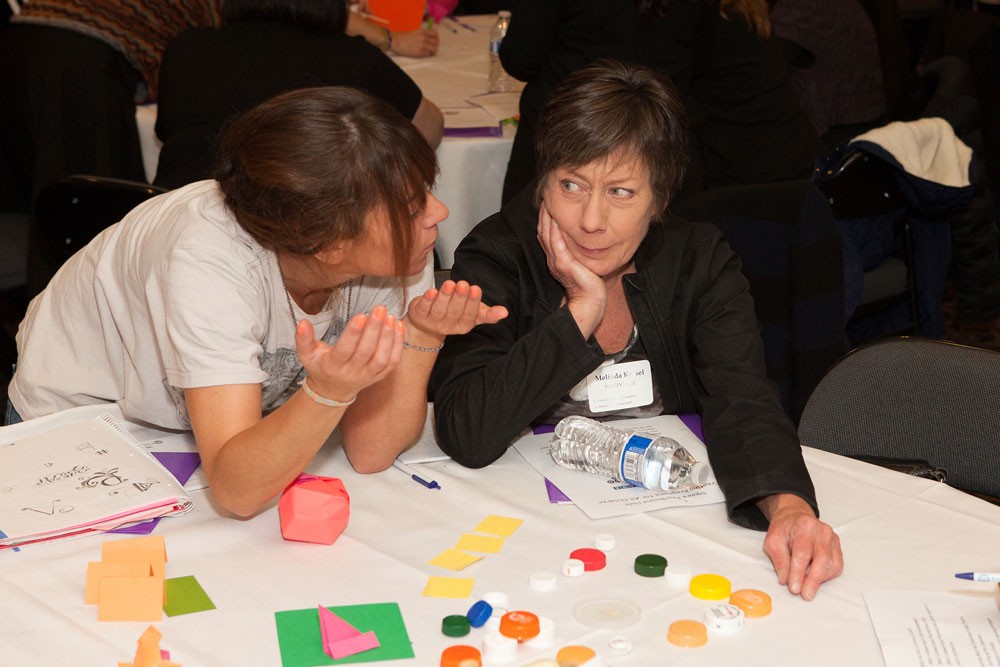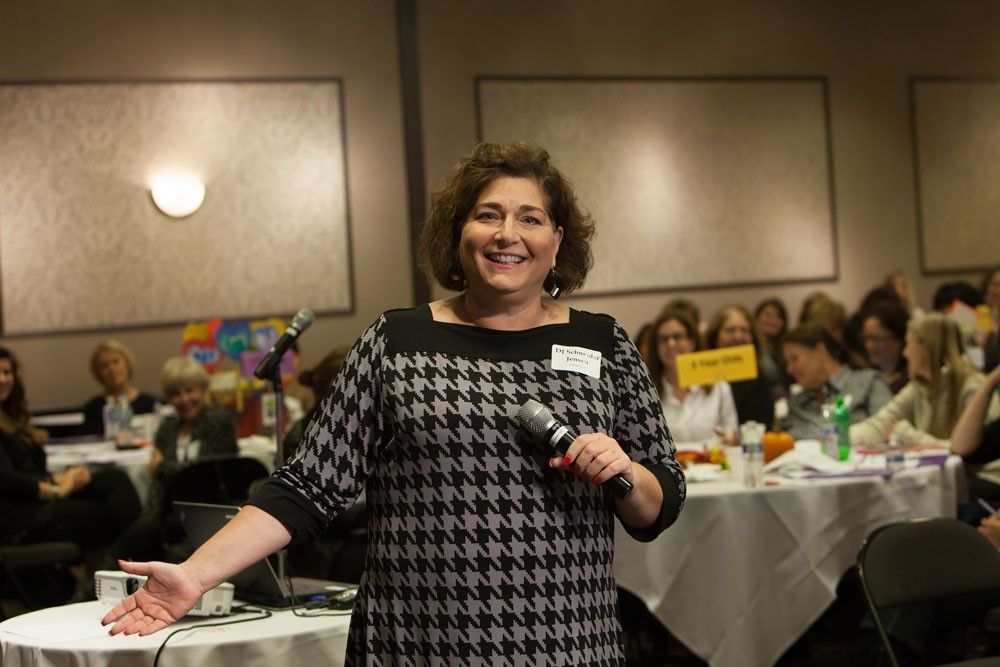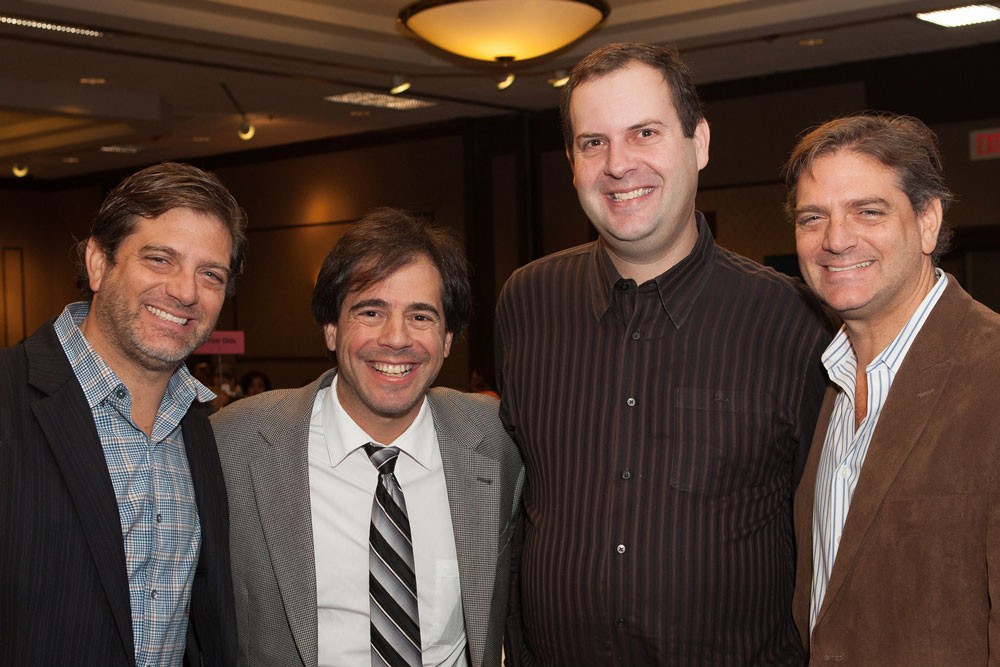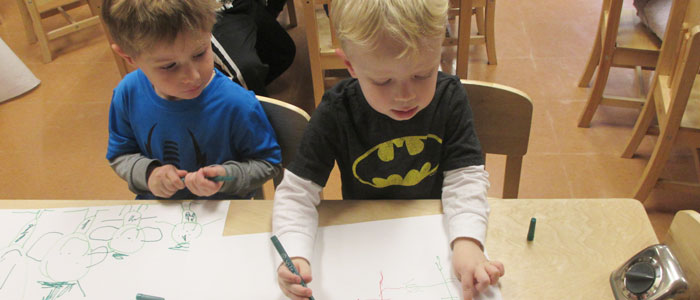Here for Good. Here for Growth.
By Vivian Henoch, Editor myJewishDetroit
January 1, 2015
They are our youngest citizens – our most precious and adorable ones. And perhaps our boldest. Those first steps into the classroom can be all at once thrilling, transformational and trepidatious. For teachers and toddlers alike.
The job of an early childhood educator is to help smooth those steps along the way — to provide a nurturing atmosphere coupled with a rich environment for learning, while staying ever-mindful of a child’s individual needs.
What once may have been thought of simply as “childcare” or babysitting is serious business today. Early childhood education (ECE) provides plenty of real-world opportunities for developing children’s social skills and fostering independence. ECE educators follow a curriculum of learning that peels like layers of an onion, one layer built upon another.
With the goal to strengthen the bonds between the Jewish community’s educational staff employed at 11 early childhood centers, as well as to give them new skills to better meet the needs of young students, Federation recently hosted a daylong Early Childhood Education Conference at Temple Israel in West Bloomfield.
They came, they explored, they learned to cut and paste, speak and communicate — and work together in new and exciting ways.
With keynote speaker DJ Schneider Jensen, the conference, entitled “Square Peg in a Round Hole: Creating Programs for All Children,” drew a diverse group of nearly 200 teachers, directors and specialists from Jeweish ECE centers located throughout metro Detroit.

Considered a change agent – a “rock star” presenter, DJ Schneider Jensen is an internationally recognized expert in early childhood education. She trains educators from all levels – teachers, directors, administrators and parents – focusing not only on setting new goals for childhood development and education, but also, and more importantly, on practical ways of achieving breakthrough results.
Lovin’ DJ
With humor and a “tell-it-like-it-is” delivery, DJ Schneider Jensen set the tone for the day with stories and life lessons drawn from 25-plus years of ECE experience condensed into her 200-page book, Monday Memo! Creating Change in Early Childhood Education, One Message at a Time. “The story takes place in a fictional school where I am the director,” she writes in the Preface of the book. “If you can suspend reality and imagine with me, I can teach you a great deal.”
In the course of the morning, participants in the conference explored the concepts of Developmentally Appropriate Practice (DAP) and Absolute Intentional Regard (AIR) to create learning experiences that are achievable and challenging for all types of learners, one child at a time.

In her teaching methods, DJ emphasizes the importance of authenticity, providing children real-world objects found in everyday life to guide their “natural progression to understanding people and the world around them. She used the example of giving children paper die-cut turkeys to decorate for Thanksgiving and how this doesn’t inform their understanding of real turkeys or even teach them what a turkey really looks like. Instead she suggested giving children real pictures of turkeys to observe and study, thereby offering them an authentic understanding of turkeys.
“Learning comes in the quiet. Ask children a question, then hush. Shh. Really. Shhh. Give them a chance to think of and share their answers.”
– DJ Schneider Jensen
Teaching moments
DJ also talked about not letting real world objects instill fear in children . . . or in teachers. A seasoned educator and administrator, DJ spent time convincing one of her teachers that she was going to teach children to make matzo ball soup and put it in real dishes to enjoy. By putting protocols in place to make sure it was a safe experience (that children were not put in harm’s way or made to carry hot, breakable dishes of soup), she allowed them to have a real opportunity to have an authentic, developmentally appropriate experience while also fostering their independence. The added bonus: everyone loved the soup and the school smelled homey and wonderful.
And while the best teachers plan in advance, DJ taught that sometimes the best learning can be spontaneous. . . seeing an opportunity to make something a moment worth seizing and going with it.
“You are never too old – or too experienced – to learn to teach something new.”
– Addy Seligman Katz
Speaking of spontaneity, the day began with an unexpected pleasure as four grown men, “friends for life,” reminisced about their preschool days back 1972 at Congregation Adat Shalom’s “House on the Hill.” Howie Borin, Max Newman, and twin brothers Mark and Craig Menuck shared their recollections and gratitude for having had the opportunity to attend a Jewish early learning program.

“So often teachers don’t get to see the results of the seeds they plant, said Amy Newman, Federation’s Alliance Senior Staff Associate, “We wanted to demonstrate for them that their work can and does change lives. These four men have become lifelong friends and active members of the Jewish community, from a foundation built in a Jewish classroom. Their experience speaks to another goal of Jewish early childhood education; to connect families to the Jewish community.”
In addition to DJ Schneider Jensen’s lively keynote and a workshop she led herself, the day included workshops led by local talent, Dr. Daniel Klein and Franki Bagdade, and national Jewish social media expert Lisa Colton. Topics ranged from effectively addressing anxiety in children; how to help a child who struggles and may need intervention; how to use social media to share what we teach; and how to work more collaboratively with other staff members.




